Winter melon soup is a popular home-cooked Chinese dish when winter melons are in season (late summer through fall). It’s also probably the most popular application of winter melon in China.
Winter melon soups are often made with pork ribs, meatballs, and seafood like shrimp and clams. We have already published a meatball soup with winter melonbut today, we’re doing the simplest winter melon soup recipe with pork ribs!
What is Winter Melon?
Winter melon is a large, mild melon used for both savory and sweet applications. It’s related to the cucumber, but has a softer texture. It’s a decent source of vitamin C and antioxidants too.
Winter melons are high in soluble fiber, so it helps aid digestion and enhance gut health. It also helps to fight inflammation and lower cholesterol for better heart health.
According to Traditional Chinese Medicine, it has cooling properties, promoting yin. With its cooling constitution, winter melon is known among TCM practitioners as an ingredient that rehydrates and clears away excess internal heat.
You may also see it referred to as wax gourd or ash gourd. It does have waxy skin with a glaucous look to it (like that gray-white bloom on the outside of an unwashed grape). When shopping for winter melon at the Chinese grocery store, look for a whole, firm melon that feels heavy for its size.
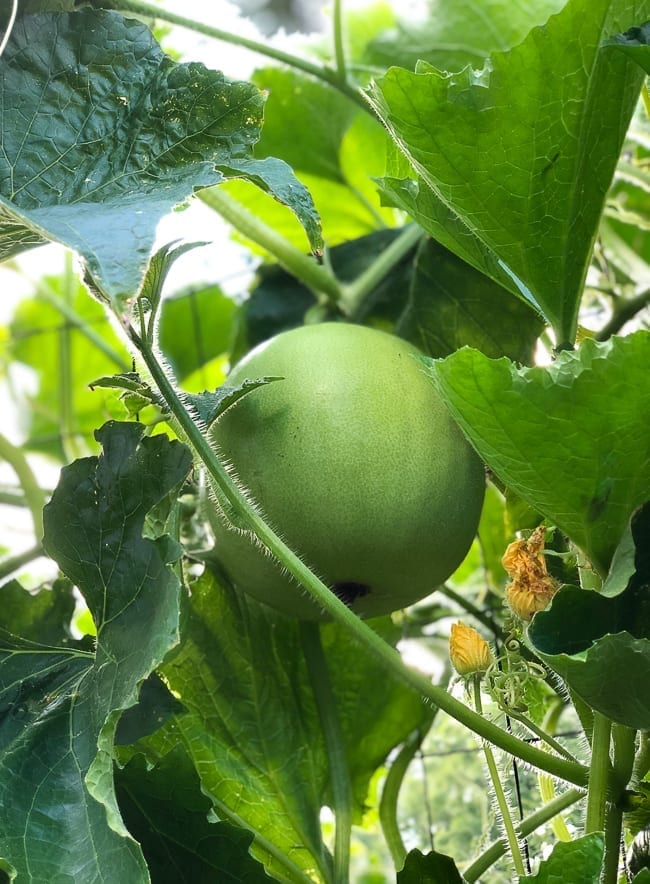

Sometimes, you can also buy winter melon that the store cuts into pieces and wraps in plastic, as they can be quite large. Just make sure the flesh is bright white and firm, since the melon doesn’t last as long once cut open.
How to Use Winter Melon
In Chinese cooking, winter melon may also be braised or used in desserts like winter melon candy, mooncake filling, and the filling for the well-known wife cake (老婆饼 – lǎopó bǐng in Mandarin or lo po baeng in Cantonese), a flaky pastry of sesame seeds and candied winter melon. (For those of you waiting on a recipe for wife cakes, we’re working on it!)
You can also eat winter melon raw, however. So I might add it to salads (I would thinly slice them into matchsticks) or even into smoothies. I know my girls will look at me funny for that one, but I would add them to my own smoothies!
Buying Pork Ribs For Soup
For this soup, much of the pork flavor comes from the meat itself. Find meaty pork ribs on the bone. You can also use rib tips (the cartilaginous parts of the rib that butchers cut away to make St. Louis ribs).
Winter Melon Soup Recipe Instructions
Soak the ribs in a bowl of cold water for 1 hour to get rid of blood and impurities. Drain. If you don’t have time, this step isn’t strictly necessary, as you’ll be blanching them also in the next step.
Add the ribs to a large soup pot along with enough water to cover. Bring to a boil. Simmer for 1 minute, and turn off the heat. Drain and rinse the ribs under running water, and clean your soup pot. This step is important––it keeps your broth clear and clean-tasting.
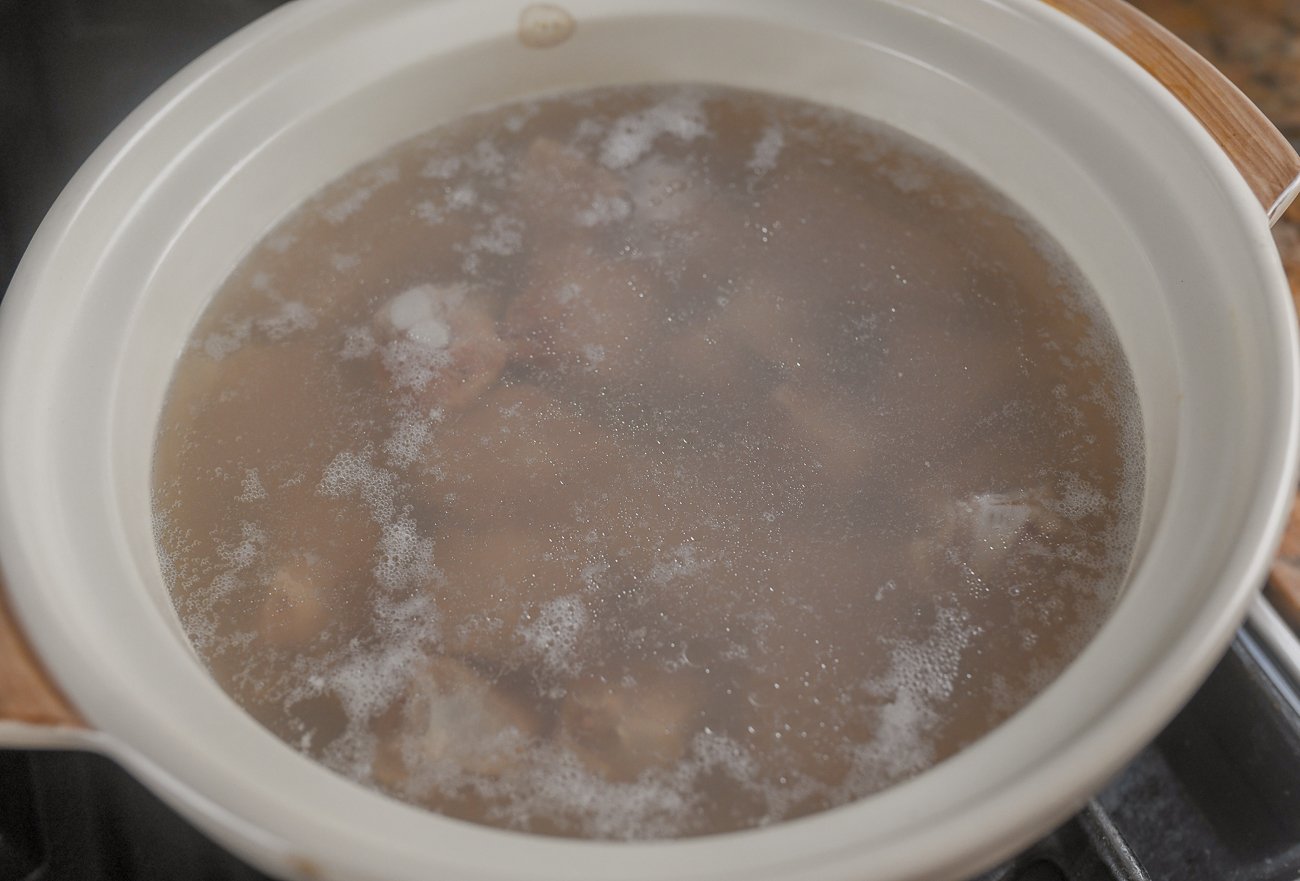

Put the blanched pork ribs, smashed ginger slices, and 9 cups of water back in the soup pot.
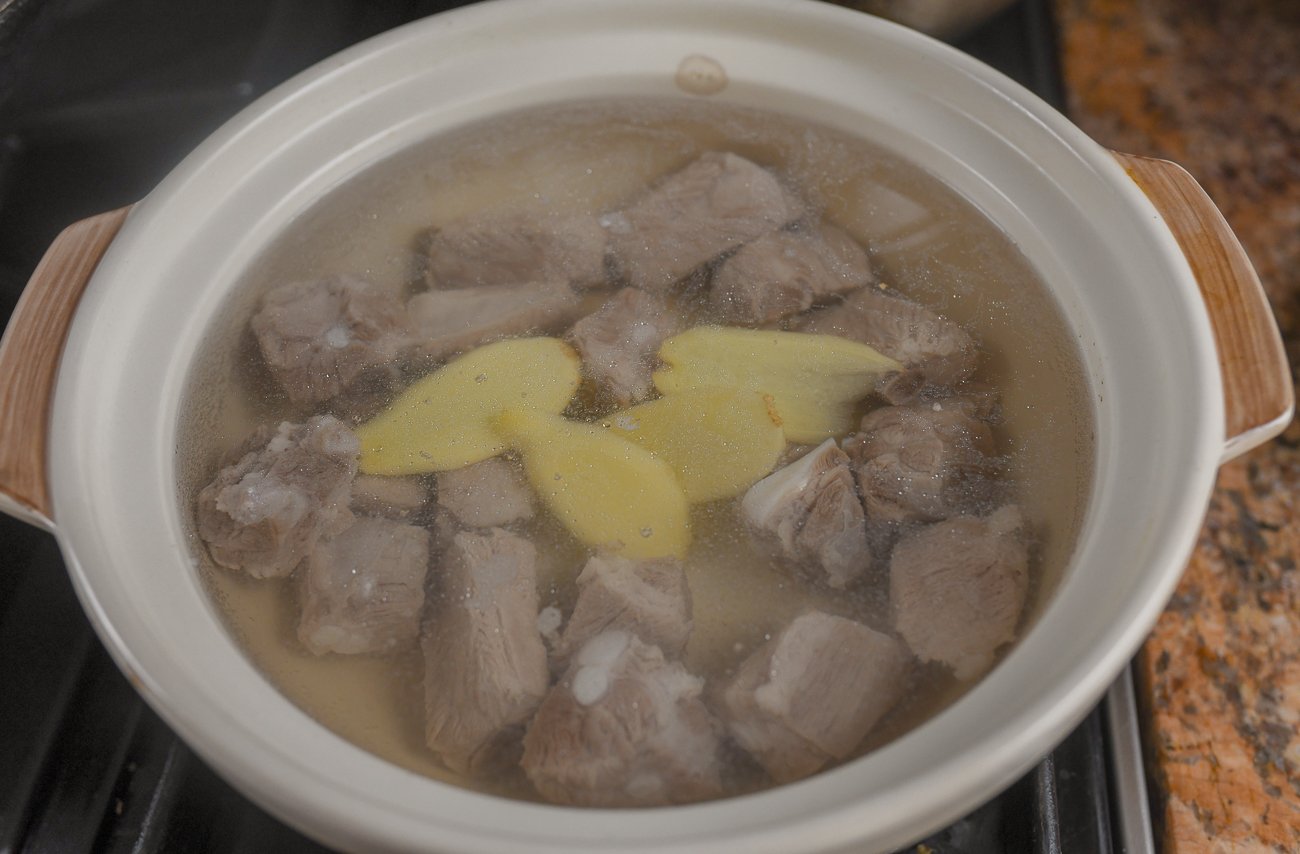

Bring to a boil, and immediately reduce the heat down to medium-low. Cover and simmer for 90 minutes. Cantonese soups require low heat for a delicate flavor and clear broth. Check on the soup periodically to make sure it is lightly simmering, but not boiling.
Meanwhile, prepare the winter melon. Trim off the thick skin, rinse it clean, and cut it into ¼-inch thick (6mm) bite-size pieces.
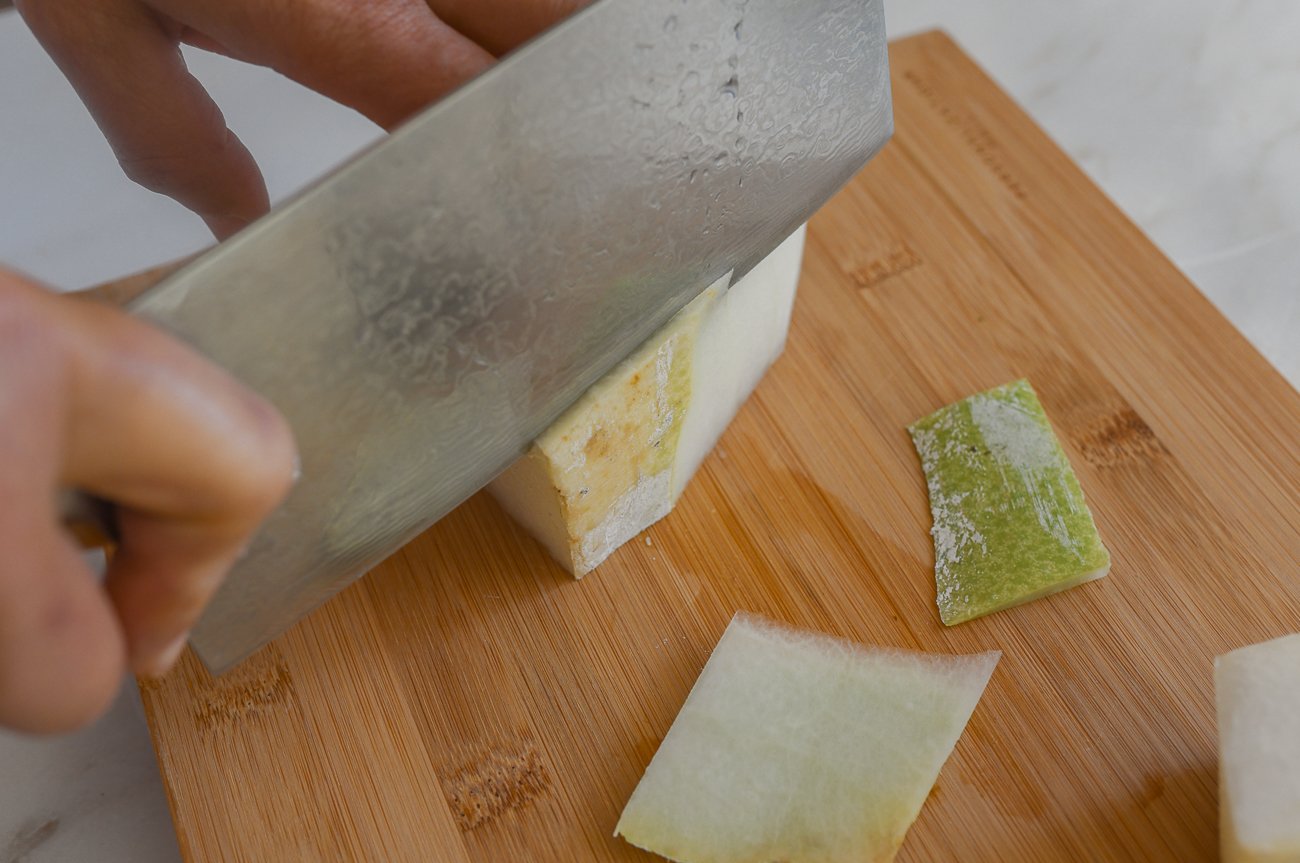

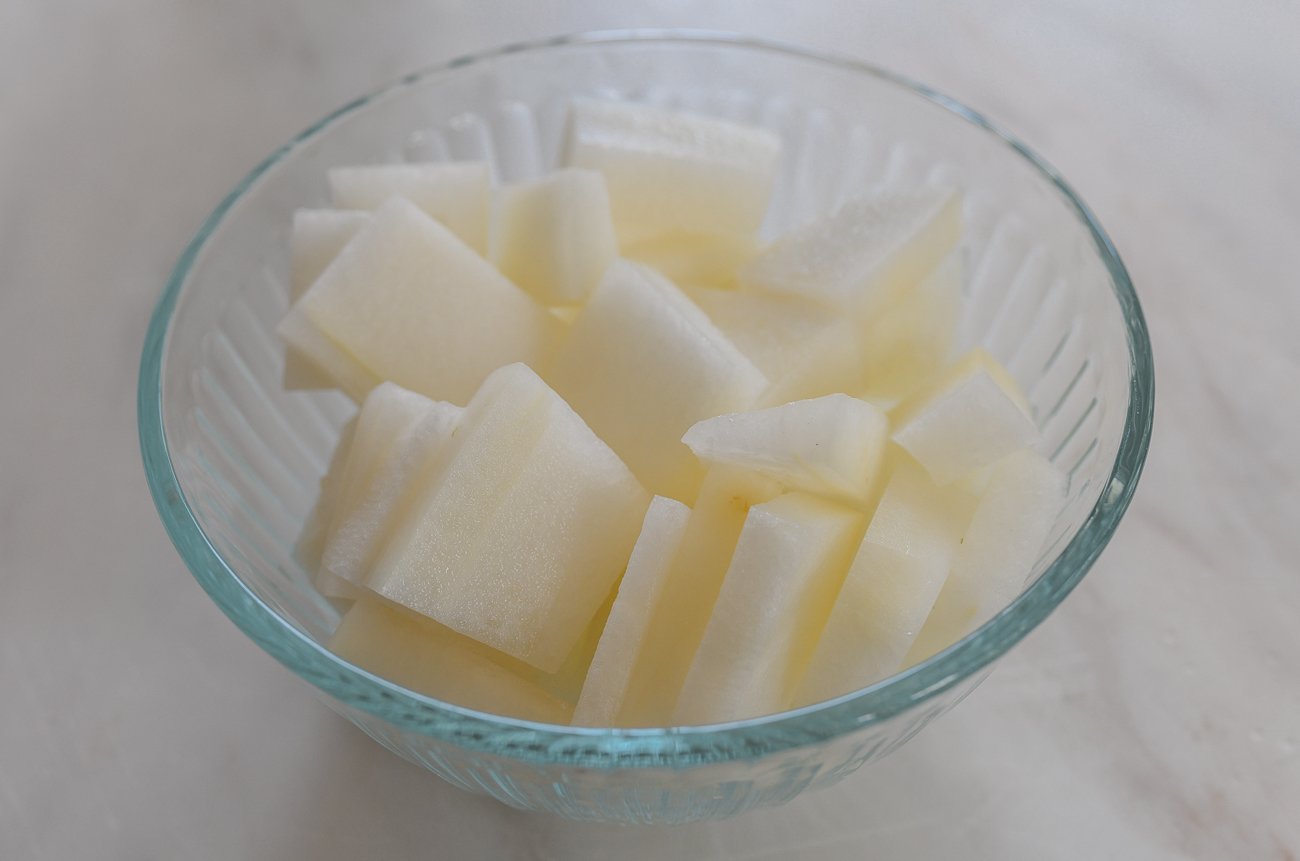

After 90 minutes, use a ladle to skim off the excess grease floating at the top of the soup. Then add the winter melon and salt.
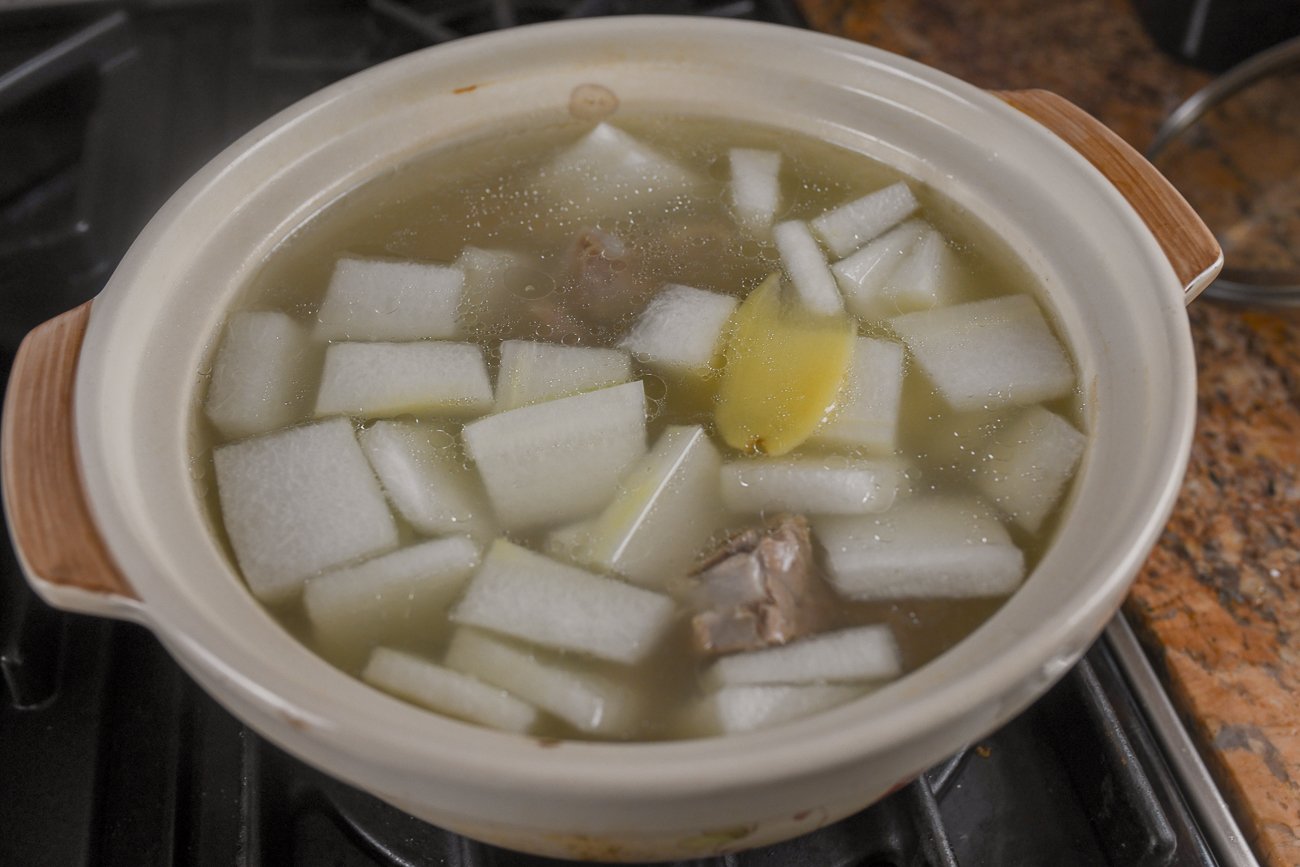

Cover and simmer for another 15 minutes, until the winter melon is just cooked through. (Don’t overcook it—it should still have some bite to it.)
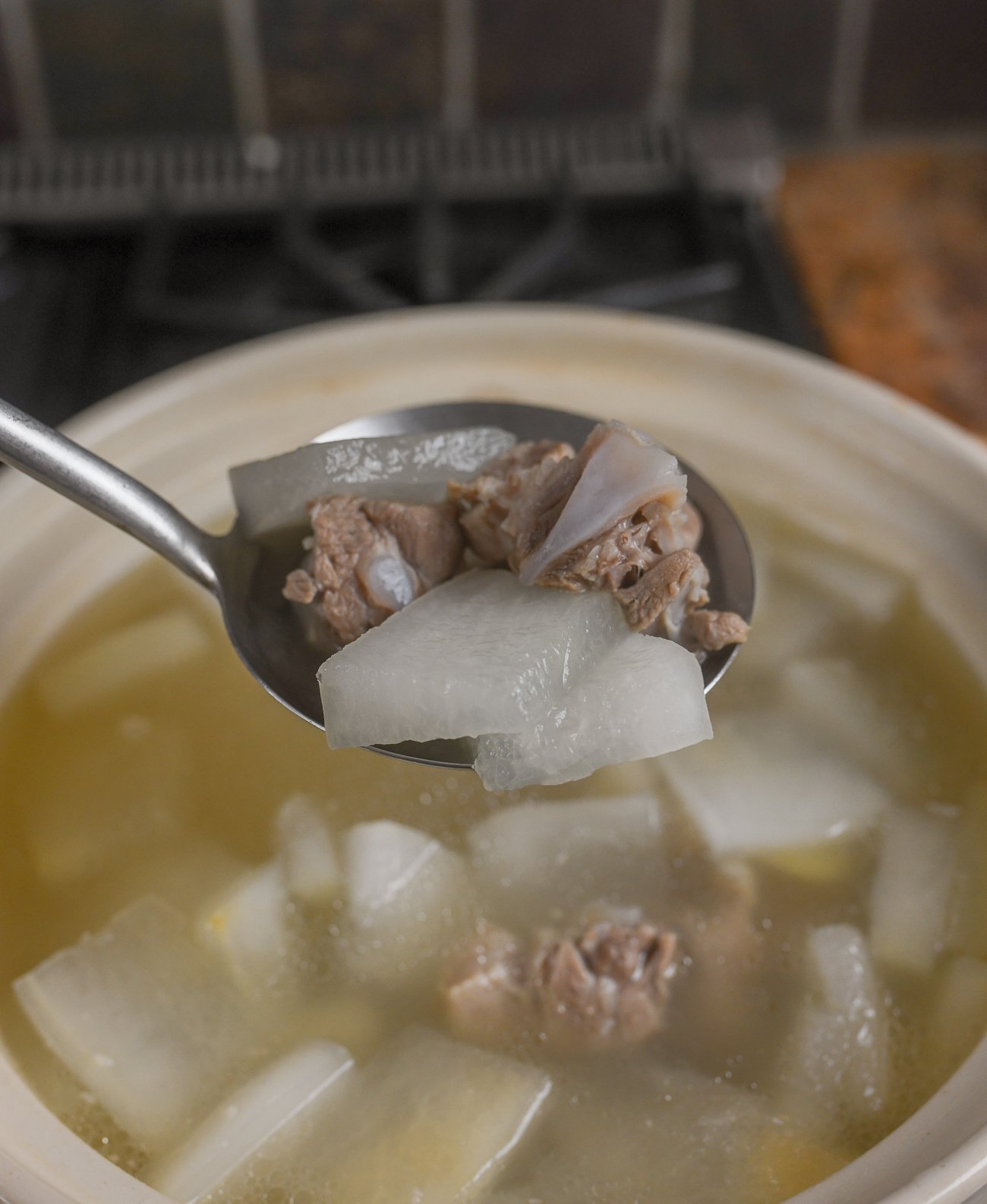

Add the white pepper and adjust the salt to taste as well. Finally, add the scallions and/or cilantro.
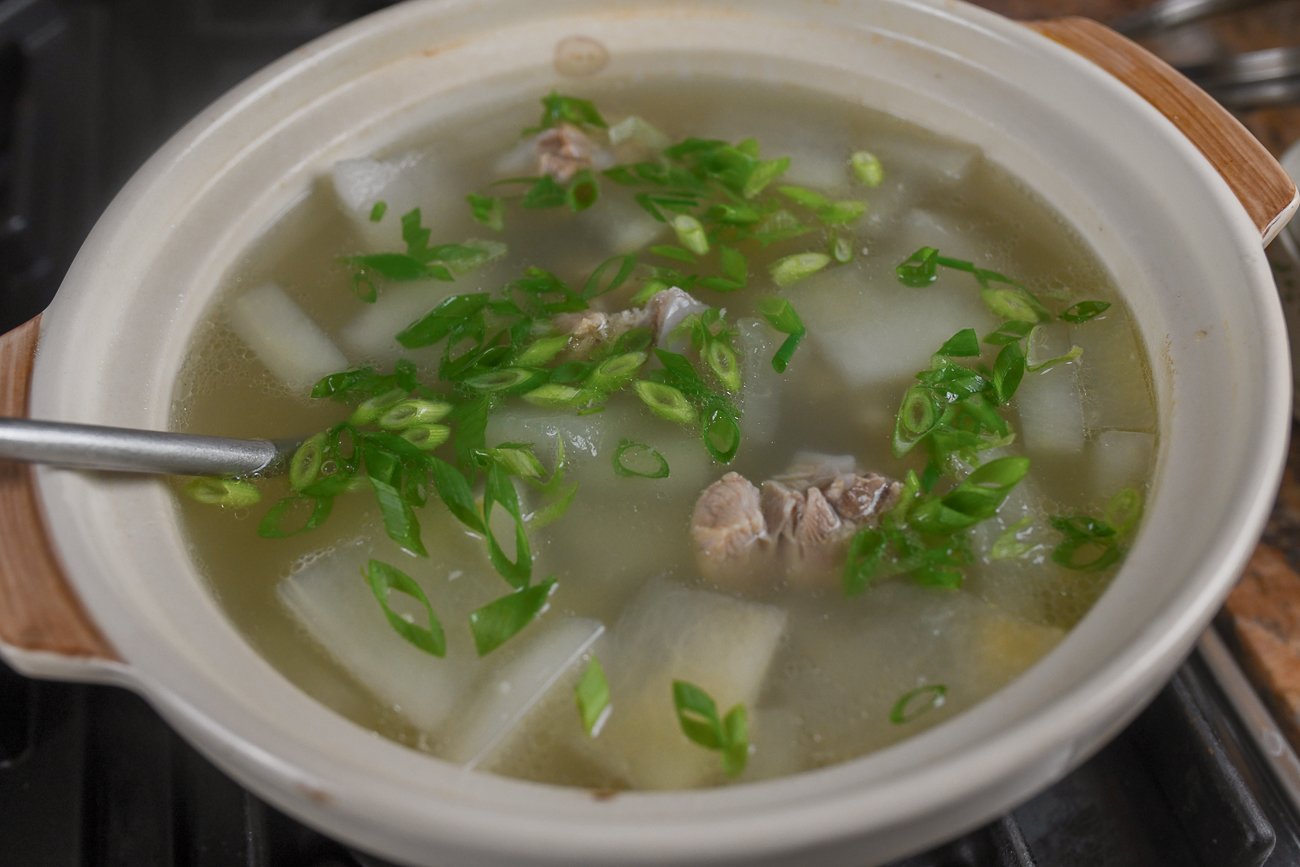

After cooking in the soup for so long, the ribs are melt-in-your-mouth tender and perfect with a little soy sauce! Serve the soup with a hot bowl of rice and a small dish of light soy sauce as a dipping sauce for the pork ribs.
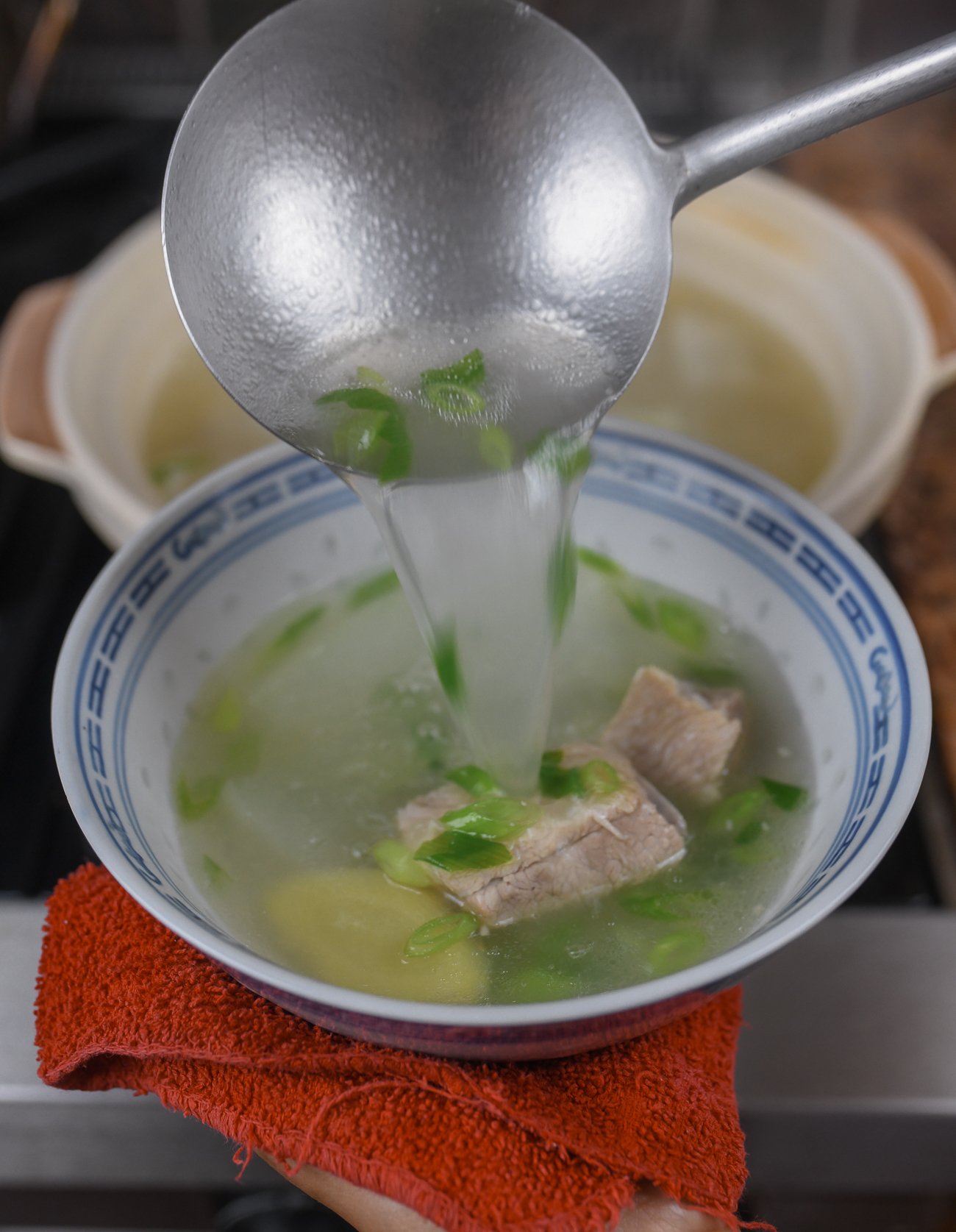

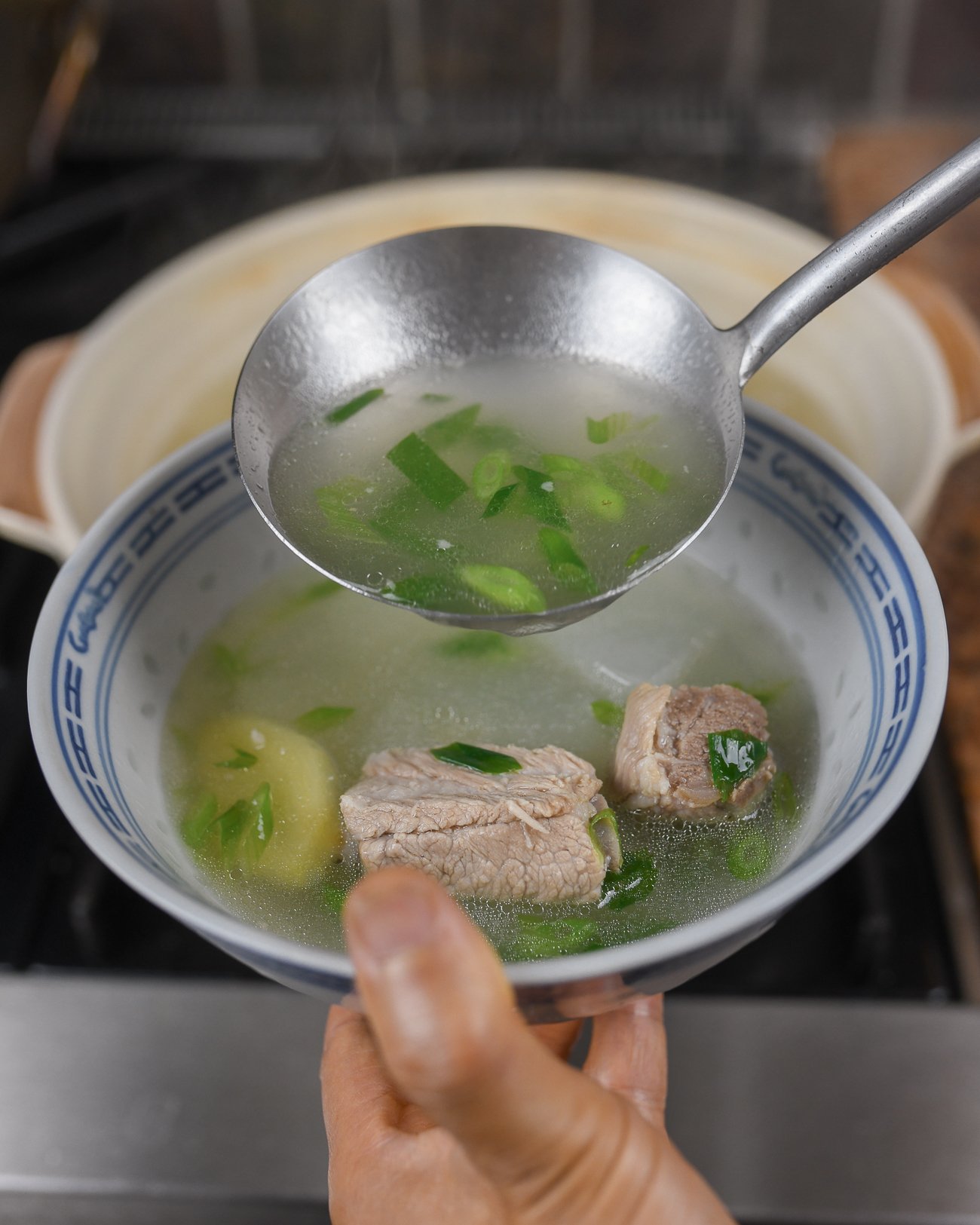

If you like this recipe and are looking for more ways to use winter melon, also check out our Winter Melon Meatball Soup with Glass Noodles!
Winter Melon Soup with Pork Ribs
Winter melon soup with pork ribs is a popular home-cooked Chinese dish and one of the most popular ways to cook winter melon.
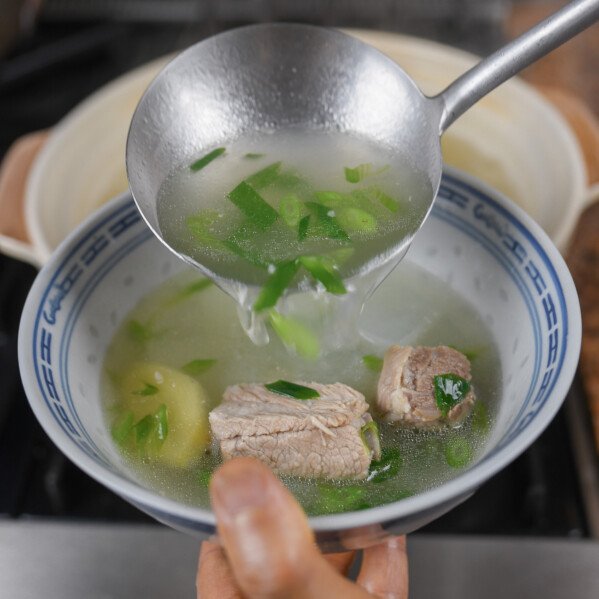

serves: 8
Prep: 1 hour 10 minutes
Cook: 2 hours 15 minutes
Total: 3 hours 25 minutes
Instructions
-
Soak the ribs in a bowl of cold water for 1 hour to get rid of blood and impurities. Drain. If you are strapped for time, this step isn’t strictly necessary, as you’ll be blanching them also in the next step.
-
Add the ribs to a large soup pot along with enough water to cover. Bring to a boil. Simmer for 1 minute, and turn off the heat. Drain and rinse the ribs under running water, and clean your soup pot. This step is important––it keeps your broth clear and clean-tasting.
-
Put the blanched pork ribs, smashed ginger slices, and 9 cups of water back in the soup pot. Bring to a boil, and immediately reduce the heat down to medium-low. Cover and simmer for 90 minutes. Cantonese soups require low heat for a delicate flavor and clear broth. Check on the soup periodically to make sure it is lightly simmering, but not boiling.
-
Meanwhile, prepare the winter melon: trim off the thick skin, rinse it clean, and cut it into ¼-inch thick (6mm) bite-size pieces.
-
After 90 minutes, use a ladle to skim off the excess grease floating at the top of the soup, then add the winter melon and salt. Cover and simmer for another 15 minutes, until the winter melon is just cooked through (don’t overcook it—it should still have some bite to it).
-
Add the white pepper and adjust the salt to taste as well. Finally, add the scallions and/or cilantro.
-
After cooking in the soup for so long, the ribs are melt-in-your-mouth tender and perfect with a little soy sauce! Serve the soup with a hot bowl of rice and a small dish of light soy sauce as a dipping sauce for the pork ribs.
Tips & Notes:
Nutrition info does not include light soy sauce served with the ribs.
nutrition facts
Calories: 230kcal (12%) Carbohydrates: 2g (1%) Protein: 13g (26%) Fat: 19g (29%) Saturated Fat: 6g (30%) Polyunsaturated Fat: 3g Monounsaturated Fat: 7g Trans Fat: 0.2g Cholesterol: 64mg (21%) Sodium: 442mg (18%) Potassium: 203mg (6%) Fiber: 0.1g Sugar: 0.03g Vitamin A: 67IU (1%) Vitamin C: 1mg (1%) Calcium: 47mg (5%) Iron: 1mg (6%)

